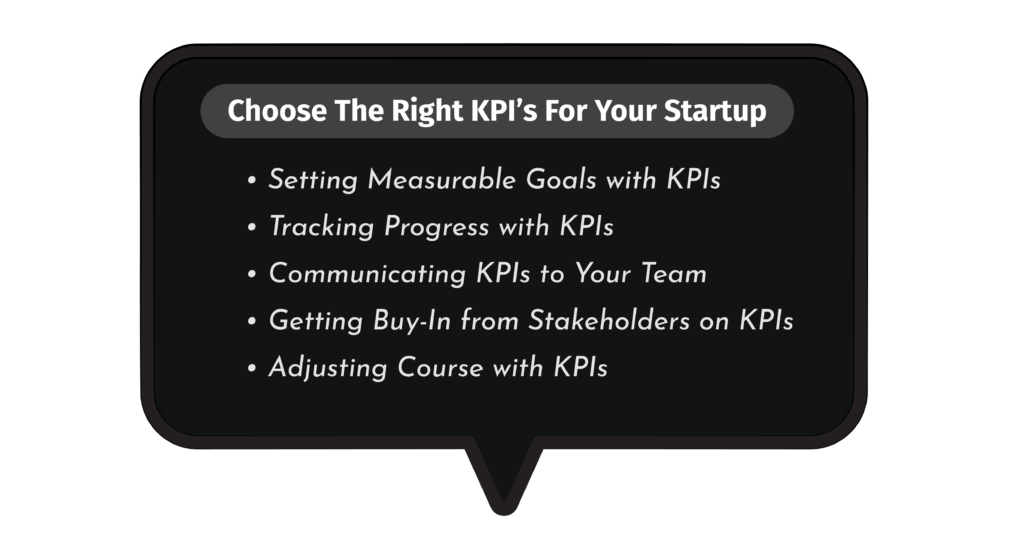This blog gives you a simple start on figuring out KPIs (Key Performance Indicators) and goals for a startup. It’s a basic introduction to help you begin learning. Once you understand the basics, you can research to learn more.

Startup KPIs Explained
Distinguishing between metrics and KPIs is vital. While metrics reveal specific data points, KPIs zone in on designated metrics directly contributing to reaching objectives. Picture metrics as the how and KPIs as the why, focusing on growth goals. The importance of tracking and measuring KPIs cannot be overstated—it transforms decision-making from gut instinct to data-driven strategies.
Which KPIs Should You Track?
Every startup’s journey is unique, and so are the KPIs they should focus on. While specific KPIs vary based on business goals, some universal metrics are indispensable. Consider these vital KPIs for your startup journey:
- Customer Acquisition Cost (CAC): Acquiring new customers at a cost.
- Average Revenue per User (ARPU): Measuring revenue generated from each active user.
- Customer Lifetime Value (LTV): Estimating the total spending of a customer over their lifetime.
- Monthly Active Users (MAU): Tracking the number of users actively engaging with your product monthly.
- Customer Churn Rate (CCR): Gauging how quickly your startup is losing customers.
- Monthly Recurring Revenue (MRR): Reflecting the monthly revenue generated.
- Revenue Growth Rate: Showing the success of revenue growth over a specific period.
- Revenue Churn Rate (RCR): Indicating the rate of revenue loss due to downgrades and cancellations.

Choose The Right KPI’s For Your Startup
1. Setting Measurable Goals with KPIs
Selecting the right KPIs is a craft. Align them with your business goals, choose those you can influence, ensure they’re measurable, provide actionable insights, and keep it simple. The benefits of well-defined KPIs are vast—better decisions, effective resource allocation, prioritized initiatives, measurable progress, and a compelling story for investors.
2. Tracking Progress with KPIs
Tracking progress involves choosing relevant KPIs aligned with your business goals. Monitor vital indicators like revenue growth, customer acquisition, retention, churn rate, net promoter score, employee satisfaction, engagement, social media mentions, and website traffic. Regularly reviewing these metrics ensures your startup stays on the path to success.
3. Communicating KPIs to Your Team
Effectively communicating KPIs to your team is a key element of success. Define each KPI, explain its significance, share results regularly, utilize data visualizations for clarity, and encourage feedback. Team alignment with your startup’s KPIs fosters a culture of shared goals and accountability.
4. Getting Buy-In from Stakeholders on KPIs
Securing buy-in from stakeholders is pivotal. Keep it simple, make KPIs actionable and aligned with business goals, and regularly review and adjust them. Transparently explain the rationale behind your chosen KPIs to gain the trust and support of stakeholders.
5. Adjusting Course with KPIs
As your startup evolves, so should your KPIs. Regularly review their relevance and adjust them accordingly. Set realistic goals, choose KPIs that provide the most insights, and remember that KPIs are part of a broader data landscape. This dynamic approach ensures your startup remains adaptable and responsive to changing circumstances.
How to Use KPIs in Your Startup?
Incorporate these best practices for optimal KPI usage:
– Keep it simple and focused.
– Align KPIs with business goals.
– Choose actionable and measurable KPIs.
– Include both leading and lagging indicators.
– Use both quantitative and qualitative KPIs.
– Leverage software for automated tracking.
– Regularly review and adjust your KPIs.
Conclusion
Remember that setting and tracking Key Performance Indicators (KPIs) is like having a roadmap for your startup’s success. Choose your KPIs wisely, keep things simple, and regularly check how you’re doing. Just like a compass guides a ship, KPIs guide your decisions.
Whether it’s understanding customer needs, growing your revenue, or keeping your team happy, KPIs help you see what’s working and what needs attention. So, don’t forget to adjust your course as your startup grows.
For guidance and support, reach out to us at pitch@bventure.com.
Your success journey begins with unlocking the power of key performance indicators!